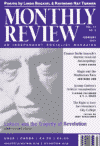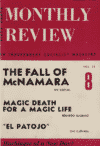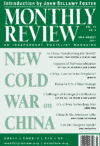Imperialism

Elizabeth “Betita” Sutherland Martinez spent her life fighting the death and destruction imposed by the White House and the Pentagon, from border jails to police barracks in every city and town across the United States. | more…

The Che Guevara Commune is far removed from the bustle of Venezuela’s huge coastal cities. You reach it by following a steep winding road from the shores of Lake Maracaibo into La Culata National Park. Lush vegetation and tall bucare trees provide good shade for coffee and cacao, which has only begun to be farmed in recent decades in this region, due to the migration triggered by the construction of the Pan-American Highway along the lake’s perimeter in the 1950s. | more…

This poem was published in volume 18, number 4, of Monthly Review (September 1966). | more…

The COVID-19 pandemic shows no signs of going away, with a new wave of SARS-CoV-2 now occurring in the form of the more readily transmittable Omicron variant. In these circumstances, the issue of vaccine imperialism, dividing the Global North and the Global South, has taken on new significance. | more…

A new poem by Linda Backiel. | more…

Notwithstanding an ongoing commitment to redouble its efforts, Cuban socialism has not taken full advantage of its own human and material resources to develop its productive forces. It is necessary to distinguish between our right and duty to struggle against the blockade and our expectations regarding what one can and cannot hope for if it is lifted. | more…

A few days ago, a cable brought the news of the death of some Guatemalan patriots, among them Julio Roberto Cáceres Valle. In this difficult job of a revolutionary, in the midst of class wars which are convulsing the entire continent, death is a frequent accident. But the death of a friend, a comrade during difficult hours and a sharer in dreams of better times, is always painful for the person who receives the news, and Julio Roberto was a great friend. | more…

As the internationalization of monopoly capital grows, particularly through the domination of global value chains, the worldwide rate of exploitation and degree of monopoly increase as well. | more…

The current situation in Haiti has roots in the historical struggle of the Haitian people, and is part of the endless retribution from imperial powers for its revolution. | more…

South Africa’s COVID-19 pandemic is one of racial capitalism, entangled with histories of imperial state formation, settler colonialism, and a hierarchical, global-neoliberal public policy architecture. | more…

Forthcoming in June 2021
In March 2015, President Obama initiated sanctions against Venezuela, declaring a “national emergency with respect to the unusual and extraordinary threat to the national security and foreign policy of the United States posed by the situation in Venezuela.” Each year, the U.S. administration has repeated this claim. But, as Joe Emersberger and Justin Podur ague in their timely book, Extraordinary Threat, the opposite is true: It is the U.S. policy of regime change in Venezuela that constitutes an “extraordinary threat” to Venezuelans. Tens of thousands of Venezuelans continue to die because of these ever-tightening U.S. sanctions, denying people daily food, medicine, and fuel. On top of this, Venezuela has, since 2002, been subjected to repeated coup attempts by U.S.-backed forces. In Extraordinary Threat, Emersberger and Podur tell the story of six coup attempts against Venezuela. | more…

This special issue of Monthly Review is devoted to the New Cold War on China. What has been the view of the Chinese Revolution presented in Monthly Review in the past seven decades? How has it changed over time? As Paul A. Baran observed: “Marx and in particular Lenin being master-tacticians shifted horses and arguments as conditions changed (rightly so, to be sure!)” The question then becomes not the changing views themselves, but how these shifts in perspective reflect changing historical circumstances. | more…











